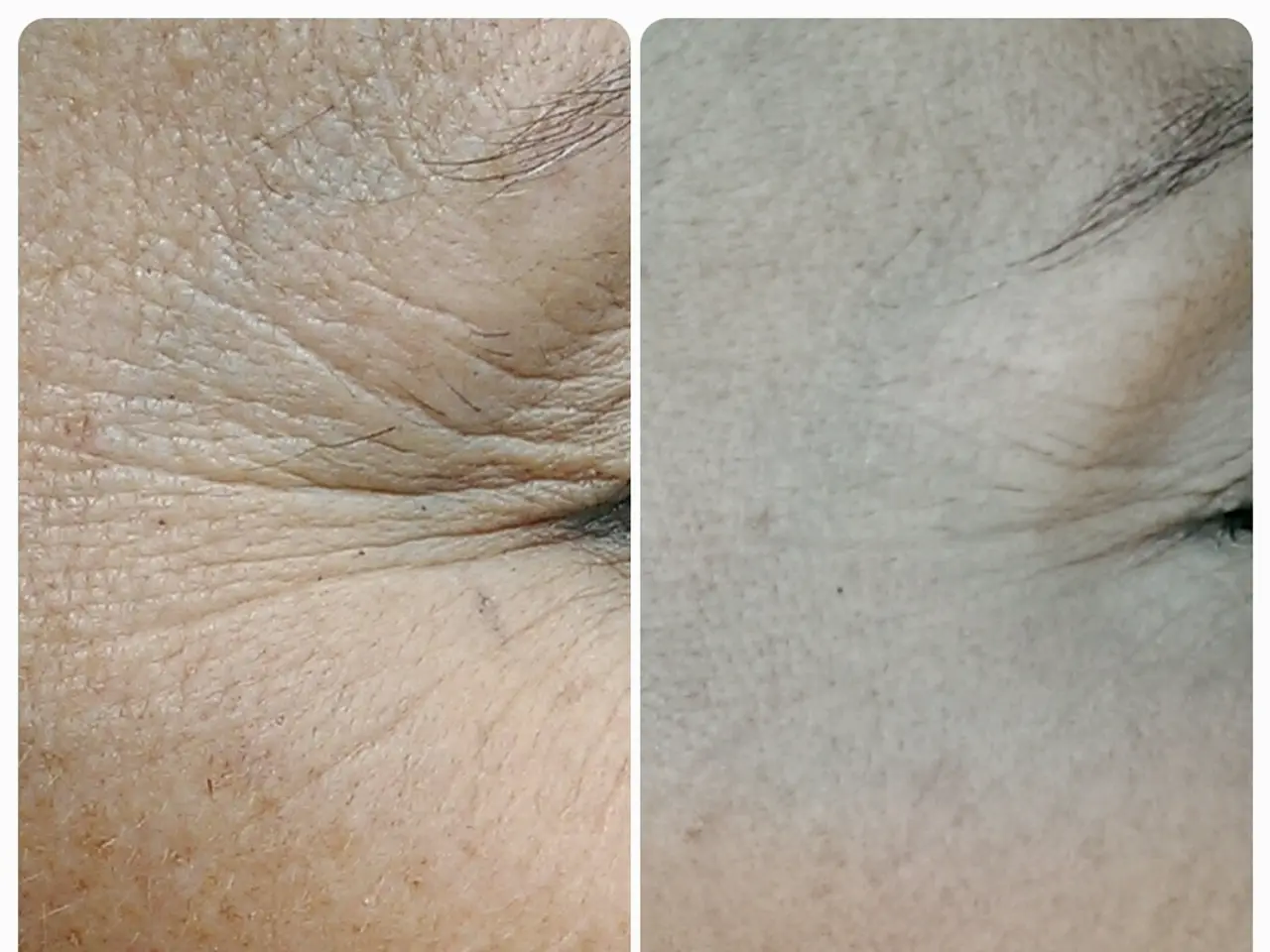Top 10 Standout Anti-Wrinkle Serums for Age-Defying Skincare
=========================================================================
In the realm of skincare, anti-aging serums have emerged as a powerful tool for maintaining youthful, radiant skin. These oil- or water-based liquids, often found in small bottles with a dropper, are designed to address a variety of skin concerns related to aging.
One such serum is the SkinCeuticals Discoloration Defense, which contains a potent blend of kojic acid, niacinamide, and tranexamic acid. This formula is tailored to reduce skin discoloration for all skin tones, promising a more even and vibrant complexion.
Another popular choice is the CeraVe Skin Renewing Retinol Serum, which boasts encapsulated retinol, ceramides, and hyaluronic acid. Retinol is renowned for its ability to minimize fine lines and wrinkles, while ceramides and hyaluronic acid work to hydrate and plump the skin, respectively.
The Peach & Lily serum is another noteworthy option, designed to target redness, an uneven skin texture, oiliness, and wrinkles. Its active ingredients include peptides, peach extract, and niacinamide.
When it comes to application, a person typically applies a serum after cleansing and drying their skin, but before using a moisturizer. It is also crucial to test a small amount of a new serum on the inner arm before regular use to check for reactions.
In the pursuit of the perfect anti-aging serum, one should consider their skin type, reviews, and ingredients. For instance, dry or dehydrated skin may benefit from hyaluronic acid and glycerin, while normal or combination skin might find success with vitamin C, peptides, or retinol (introduced gradually to avoid irritation).
Key serum types, their benefits, and active ingredients include:
- Vitamin C Serums - These brighten the complexion, fade age spots, boost collagen production, provide antioxidant protection against environmental damage, and improve skin tone. The active ingredients are vitamin C (ascorbic acid or stabilized derivatives), often combined with antioxidants like ferulic acid and vitamin E for enhanced stability and efficacy.
- Retinol/Retinoid Serums - Minimize fine lines and wrinkles, improve skin texture and elasticity, and stimulate collagen synthesis. The active ingredients are retinol or prescription retinoids such as tretinoin.
- Peptide Serums - Firm skin, reduce deep wrinkles and fine lines by enhancing collagen and elastin production. The active ingredients are peptides such as Matrixyl Synthe’6®.
- Alpha Arbutin Serums - Fade hyperpigmentation, dark spots, and even skin tone. The active ingredient is alpha arbutin, often with hydrating hyaluronic acid.
- Hydrating Serums - Provide deep hydration, plump and dewy skin appearance, reduce dryness and fine lines caused by dehydration. The active ingredients are hyaluronic acid and glycerin.
- Pore Minimizing Serums - Unclog pores, reduce their appearance, improve skin texture. The active ingredients are niacinamide and salicylic acid.
In choosing an anti-aging serum, skin type and concerns guide ingredient selection. For example, dry or dehydrated skin might benefit from hyaluronic acid and glycerin, while mature skin with signs of aging could find success with retinol, peptides, vitamin C, and alpha arbutin.
Medical-grade and professional formulations, such as SkinCeuticals Vitamin C serums, generally provide higher efficacy with clinically proven concentrations, especially for mature skin.
In summary, effective anti-aging serums combine targeted ingredients like vitamin C, retinol, peptides, and alpha arbutin based on skin type and aging concerns, delivering benefits from hydration and brightening to wrinkle reduction and pore minimization. However, it is essential to remember that no skin care product can fully prevent or reverse the visible signs of aging. After applying the serum and moisturizer during the day, it is advisable to use a mineral sunscreen with SPF 30 or higher.
[1] "The Best Anti-Aging Serums for Every Skin Type." Byrdie.com, 10 Aug. 2020, www.byrdie.com/anti-aging-serums-4573094.
[2] "The Best Anti-Aging Serums for Every Skin Concern." Allure.com, 16 Sept. 2020, www.allure.com/story/best-anti-aging-serums.
[3] "The Best Anti-Aging Serums for Every Skin Type." Harper's Bazaar, 13 Nov. 2019, www.harpersbazaar.com/beauty/skincare/g37428981/best-anti-aging-serums/.
[4] "SkinCeuticals Vitamin C Serum Review: A Powerful Antioxidant." Dermstore.com, www.dermstore.com/content/skinceuticals-ce-ferulic-acid-with-15-percent-l-ascorbic-acid-30ml/CT0000175.
[5] "The Best Anti-Aging Serums for Every Skin Type." Marie Claire, 16 Sept. 2020, www.marieclaire.com/beauty/g35728073/best-anti-aging-serums-2020/.
- Some people may experience depression due to the effects of certain diseases, such as bipolar or Crohn's, which can negatively impact their health-and-wellness.
- Science has developed predictive models to help understand the progression of diseases like multiple sclerosis and NSCLC, enabling researchers to work towards finding effective treatments.
- Acid, such as kojic acid, niacinamide, tranexamic acid, and alpha arbutin, are active ingredients in some anti-aging serums designed to address skin concerns like discoloration, hyperpigmentation, and age spots.
- Sensitive skin may require extra care when choosing skincare products, as certain acids or retinol might cause irritation.
- AQ (aqua), also known as water, is a common ingredient in skincare products, including anti-aging serums, serving as a base for other active ingredients.
- Hyaluronic acid, a natural moisturizing factor found in the skin, is often used in hydrating serums to plump and dewy skin appearance, reducing dryness and fine lines caused by dehydration.
- Science continues to advance in the field of health-and-wellness, with the discovery of potential treatments for various diseases, such as multiple sclerosis, NSCLC, and Crohn's.
- Skin care routines might include the use of an anti-aging serum, which, when applied after cleansing and drying the skin but before a moisturizer, can help address concerns related to aging like wrinkles, discoloration, and dryness.




